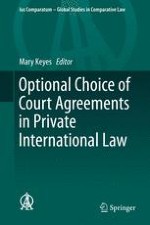Abstract
A forum selection clause is a form of contractual waiver. By this device, a contract party waives its rights to raise jurisdictional or venue objections if a lawsuit is initiated against it in the chosen court. (If the forum selection is exclusive, then that party also promises not to initiate litigation anywhere other than in the chosen forum.) The use of such a clause in a particular case may therefore raise a set of questions under contract law. Is the waiver valid? Was it procured by fraud, duress, or other unconscionable means? What is its scope? And so on.
Unlike most contractual waivers, however, a forum selection clause affects not only the private rights and obligations of the parties, but something of more public concern: the jurisdiction of a court to resolve a dispute. The enforcement of such a clause therefore raises an additional set of questions under procedural law. For instance, if the parties designate a court in a forum that is otherwise unconnected to the dispute, must (or should) that court hear a case initiated there? If one of the parties initiates litigation in a non-designated forum that is connected to the dispute, must (or should) that court decline to hear the case?
Under US law, the bottom line is straightforward: almost always, in consumer as well as commercial contracts, forum selection clauses will be enforced. Navigating the array of substantive, procedural, and conflicts rules whose interplay yields that result, though, is far less straightforward. That is the task of this report. Section 2 provides a brief background on the general attitude toward forum selection clauses. Section 3 surveys current state law on their use, in consumer as well as commercial contracts. Section 4 addresses the interpretation of forum selection clauses as either permissive or exclusive. Section 5 analyzes the effect of permissive clauses in state and federal courts. Finally, Sect. 6 turns to choice of law problems, particularly as they arise in the course of litigation in federal courts.
